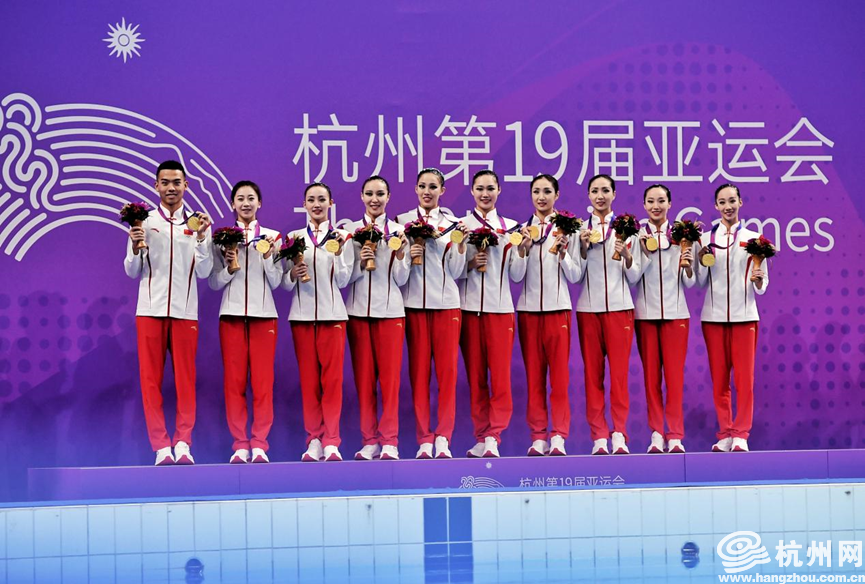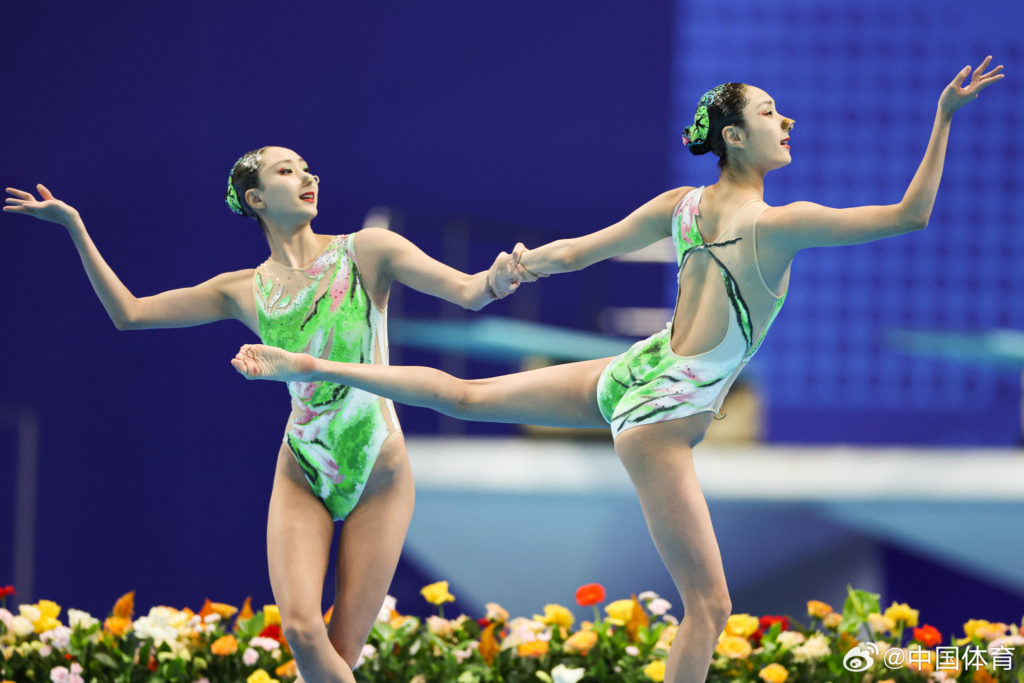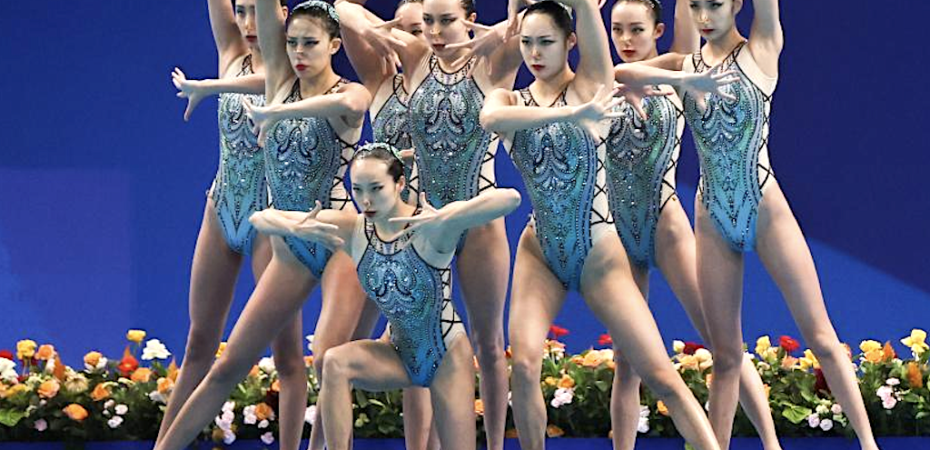China and Japan have secured Olympic berths to the Paris Games in artistic swimming through their successful performances at the 19th Asian Games in Hangzhou, China.
One team quota and essentially two duet quota (one via the team, one via the duet competition) to the 2024 Olympic Games were up for grabs at this competition. With its victory in the team event, China qualified to Paris in both the team and consequently the duet. As the Chinese pair also won the Asian Games duet gold on Saturday, the remaining duet quota goes to Japan, silver medalists and the next-best duet not already qualified.
“We are happy to win the gold medal at home and qualify for the Paris Games,” Feng Yu of China said. “But we still have a lot of things to improve.”
The artistic swimming competition at the Asian Games followed the same format as the Olympics, where only two medals were awarded for duet and team, based on combined scores.
In the team events, China was already leading Japan by over 25 points after the acrobatic and technical routines. On the final day, the country simply couldn’t be beaten in the free routine, scoring 341.4875 points for a combined total of 868.9676. This is China’s fifth gold in a row in the team event; the nation has always won the team gold ever since the event was first introduced in 2006.
Since the World Championships in July, the Chinese have significantly increased their Degree of Difficulty (DD) across all team routines, but most notably in the free event. Reigning World Champions in this event, they were credited with a massive 51.35 for its “Gravity” free routine, the highest DD so far this season and an increase of four points since Fukuoka.
“The Chinese team will strive to find the right balance between movement difficulty and artistic expression under the new rules, prepare for the Olympics in a down-to-earth manner, and strive to show its strength on a larger stage,” head coach Zhang Xiaohuan said.
Moreover by swimming in the acrobatic team, Shi Haoyu became the first male artistic swimmer to win a medal at the Asian Games. It was the first time that male were allowed to compete in artistic swimming at this competition.
“I am really looking forward to the Olympic stage, a platform never before seen by male artistic swimmers,” Shi said. “A lot of people still don’t understand the sport, but I think more will learn it, accept it and appreciate it when we show how competitive and inspiring it can be at the Olympics. Whether people approve of it or not, at least they will begin to pay attention to it.”

With China focused and unwavering routine after routine, Japan could never quite catch up and finished 37.7141 points behind with a total of 831.2535. Similarly to their competitors, the Japanese had also increased their DD across all team routines since Fukuoka, but most drastically in their “Chess” free routine, going from 45.85 to 51.25.
Kazakhstan won the team bronze on 663.7417, an exciting improvement from its fourth-place finish in 2018. While the nation had already earned two bronze medals in free combination in 2010 and 2014, this is its first medal in the Olympic team events.
This competition also marked the return of North Korea to the international stage. The North Korean team hadn’t competed since the last Asian Games in 2018, where it had won bronze in team and finished fourth in duet. In Hangzhou, the country was in a tight race with Kazakhstan for the team bronze, especially after finishing over 12 points ahead in technical team. Before the free team, the ultimate event, North Korea had even declared a 50.40 DD, the third-highest of the field, while Kazakhstan was “only” going for 39.95.
Ultimately, the Kazakh’s strategy paid off as they received full credit while the North Koreans had four base marks. The latter had to settle for fourth this time around, but will hopefully use this first meet in five years as a learning experience, and will be back to competing regularly.
In duet, China‘s Wang Liuyi and Wang Qianyi were also unbeatable, reaching a total of 526.8620 to secure the gold. Putting their disappointment from their fourth-place finish in Fukuoka aside, the twins started out strong with their technical routine to the theme of “Lotus”, scoring 266.5767. Their “Cheetah” free routine ultimately sent them to the top of the podium, earning 260.2853 and cementing the fifth duet gold in a row for China at the Asian Games.

Higa Moe and Yasunaga Mashiro of Japan earned silver with a total of 489.4288. Although they are the reigning world champions in technical duet and bronze world medalists in free duet, the Japanese actually dared to decrease their DD since Fukuoka, aiming to focus on execution, height, and mastery of skills in each routine. In Hangzhou, they went from 34.30 to 32.30 in technical duet, and from 39.40 to 36.85 in free.
After the duet competition concluded, Yasunaga admitted that the competition in Fukuoka, which included fast changes and increases of DD between preliminaries and finals, might have been a bit too much, despite them coming away with a gold and a bronze.
“There were times when we felt like we weren’t doing very well,” she said. “For this competition, we came with routines and a set-up that we were certain we could do well, and deliberately lowered our DD. We want to perform as aggressively as the Chinese, but with certainty at the same time. We want to be sure of our performance and ourselves.”
Thanks to this silver and the qualification of China’s duet through the team, the Japanese have guaranteed themselves a spot in the duet competition in Paris. The team will have one more chance to qualify to the 2024 Olympics via the Doha World Championships in February.
Arina Pushkina and Yasmin Tuyakova secured Kazakhstan‘s second bronze in duet with a total of 418.6987. This is the country’s third duet bronze in a row at the Asian Games, and fourth overall.
Besides Shi Haoyu, Kantinan Adisaisiributr of Thailand was the only other male artistic swimmer participating in the Asian Games. Adisaisiributr has been a key member of the Thai squad since he switched from swimming in 2019, following his older sister Jinnipha who was also competing here in Hangzhou.
Japan’s Sato Yotaro had originally been named to the squad, but didn’t participate due to “bad health condition” according to the Japanese press.
ARTICLE BY CHRISTINA MARMET
If you’ve enjoyed our coverage, please consider donating to Inside Synchro! Any amount helps us run the site and travel costs to cover meets during the season.

